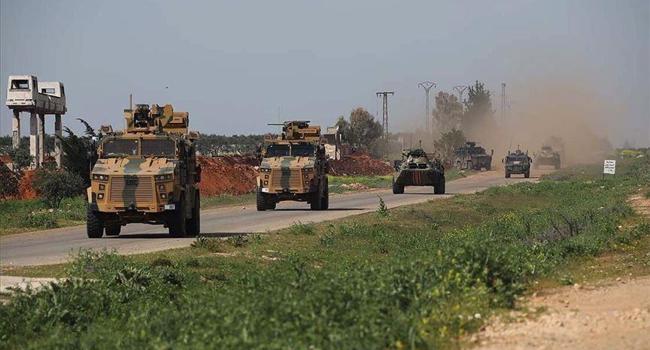Turkish, Russian, Iranian top diplomats to meet online for Syria
ANKARA

The foreign ministers of Turkey, Russia and Iran will hold a teleconference meeting on April 22 to discuss the developments in the Idlib province of Syria amid a fragile ceasefire between the Turkish army and Syrian regime forces.
The teleconference will bring Foreign Minister Mevlüt Çavuşoğlu, Russian Foreign Minister Sergei Lavrov and Iranian Foreign Minister Javad Zarif together as the three guarantor countries of the Astana Process.
The three-way mechanism was established in early 2017 with the objective of reducing the violence, eliminating terrorist elements and boosting a political solution to the nearly a decade-old conflict.
The meeting comes as a Turkish-Russian deal brokered on March 5 that stipulates the cessation of military activities in Idlib still holds, but amid reports over provocative moves by radical jihadist organizations as well as the Syrian regime forces’ attempt to break the truce.
President Recep Tayyip Erdoğan urged both the Syrian regime and terror elements not to carry out provocative moves at a press conference late April 21, after an online cabinet meeting.
“We see that the Syrian regime, which seeks to take advantage of the fact that the world and Turkey are now focused on the fight against the pandemic, has increased its aggression in Idlib. Even though Turkey remains committed to the March 5 Memorandum reached with Russia, it will not allow aggression by the regime,” he said.
“The regime will have to pay for it with heavy losses if it continues to violate the ceasefire and other terms of the memorandum. We will not tolerate shady groups that engage in provocative activities in an attempt to disrupt the climate of ceasefire in Idlib, either,” added the president.
It is believed that Erdoğan was referring to radical terrorist organizations when mentioning “shady groups,” which have been in efforts to block the Turkish-Russian combined patrolling over the M4 highway.
Zarif met Syrian leader Assad in Damascus
The three-way dialogue comes after Zarif met Syrian President Bashar al-Assad in Damascus on April 20.
Zarif also met with his Syrian counterpart, Walid Muallem.
They stressed “the importance of continued coordination and the exchange of information and expertise between…the two countries to enhance their ability to confront” the pandemic and “secure the necessary needs and requirements for prevention, diagnosis and treatment.”
A photo released by the Syrian presidency showed the visiting foreign minister and president sitting opposite each other, both wearing face masks. Zarif also wore light blue plastic gloves.
'185,000 Syrians returned to Idlib since cease-fire'
s many as 185,000 displaced Syrians have returned to their homes in Idlib, northwestern Syria, since Turkey and Russia agreed on a new cease-fire in the region last month, an official has said.
Around one million Syrians were displaced from the province when the Assad regime and its allies launched an offensive in November 2019.
Most of the refugees sought shelter at camps close to the border with Turkey, while others went to areas under the control of the Syrian opposition.
Speaking to Anadolu Agency on April 21, Muhammad Hallaj, the director of Syria's Response Coordination Group, said that many of the displaced Syrians returned to their homes immediately after the cease-fire.
Nearly 37,000 families have returned to Idlib city and its nearby rural areas, and the Aleppo countryside, he added.
The director called on NGOs to increase their aid activities for the safe return of civilians, adding that he expected more people to go back if the cease-fire continued.
President Erdoğan and his Russian counterpart Vladimir Putin agreed on March 5 to a new truce in Idlib to end hostilities and attacks on civilians.
The protocol urged parties to "cease all military actions along the line of contact in the Idlib de-escalation area starting from 00.01 [2101GMT] of March 6, 2020."
Syria has been ravaged by a civil war since early 2011 when the regime cracked down on pro-democracy protesters.
Hundreds of thousands of people have been killed and more than 10 million remain displaced, according to UN estimates.
Idlib, which is home to over three million people and falls under the de-escalation zone, has been the subject of multiple cease-fire agreements over the years but the deals have been frequently violated by Syrian forces and their allies.
Turkey hosts more than 3.7 million refugees -- more than any country in the world.

















